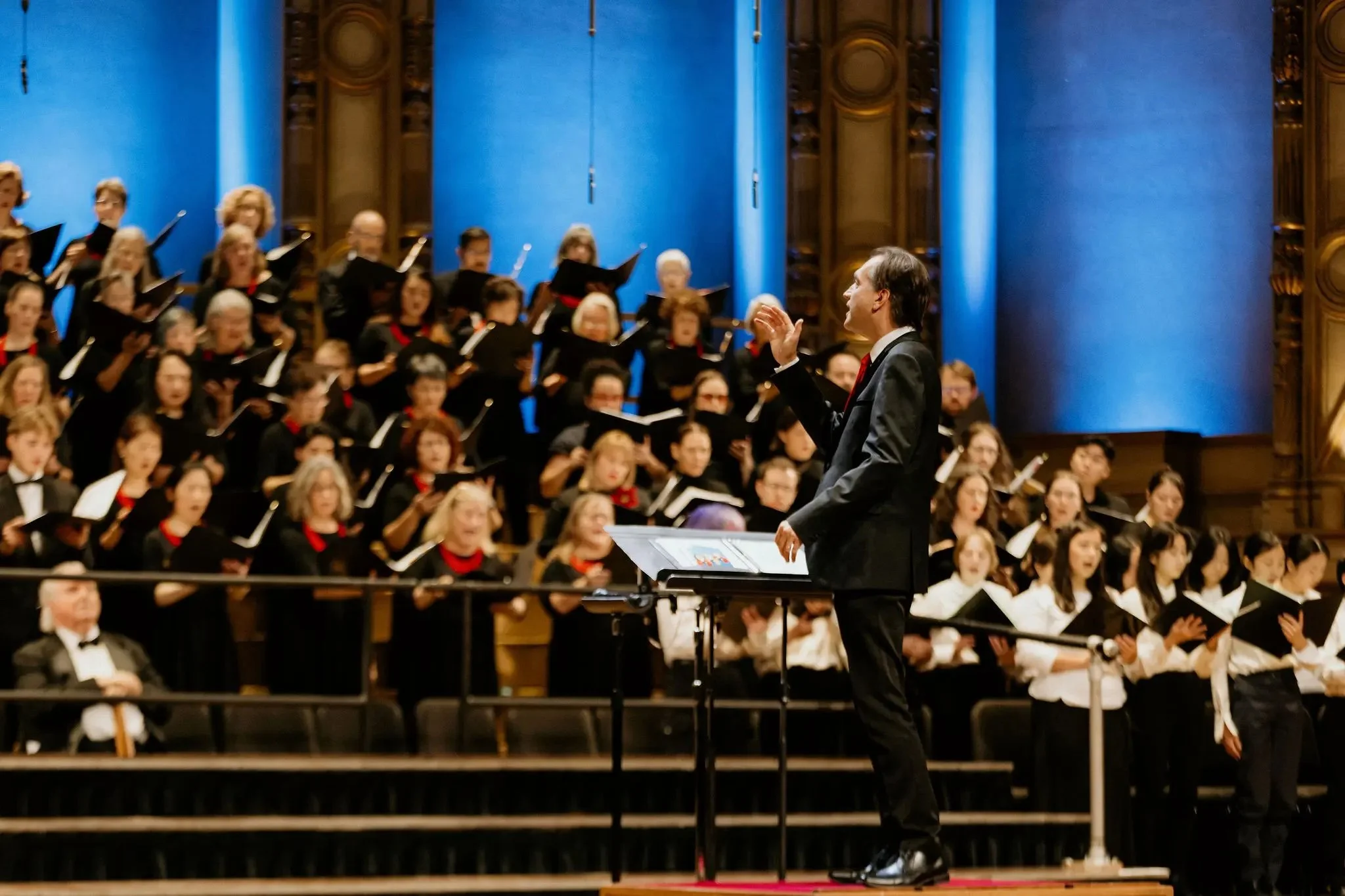Not your "typical" choral performance: musica intima broadens creative boundaries with the Beginning of Song
The conductorless vocal ensemble’s upcoming virtual concert merges music, spoken word, and film
Musica intima is a 12-member conductorless ensemble.
Musica intima presents the Beginning of Song, premiering April 30 at 7:30 pm PDT. It will be available on YouTube for two weeks.
IF YOU HAVE a certain stereotypical image in your mind of what a choral performance looks and sounds like, musica intima’s upcoming show may make you think again. The Beginning of the Song is a digital concert unlike anything the 12-voice conductorless ensemble has ever done before. Commissioned spoken-word responses to sung texts by Ottawa-based Kenyan-Canadian multidisciplinary artist Germaine Konji are among the elements that take this presentation far beyond any standard choir offering.
Based on the theme of connection and collaboration during social isolation, the virtual production also features videos filmed in and around the Coast Salish Territories and a quartet of mentored singers from the Vancouver Youth Choir.
“For almost 30 years, musica intima has been wanting to shift the way the world thinks about choral music—from what it is to how it’s presented,” artistic manager Jacob Gramit tells Stir. “The Beginning of the Song really holds true to those values. We have pieces that are part of our unique canon of commissions, choral classics given our collaborative treatment, and new perspectives from our mentored singers and from Germaine. This is a different experience than our Christmas concerts.
“You’ll see some pieces that are more like music videos, some that were live-to-tape, some shot in spaces you know, and some that might be less familiar, plus the pieces from Germaine; it’s an experience that you could never have in a concert hall,” he says. “From the beginning of the pandemic, we were talking in the ensemble not about how to create digital content from our concerts but what we wanted to say that could best be expressed digitally. I think, a year later, we’ve found that.”
Musica intima collaborated with rising theatre Germaine Konji for its new show.
The collaboration with Konji proved especially inventive. A graduate of Sheridan’s Honours Bachelor of Music Theatre Performance who grew up in a home filled with song, dance, storytelling. She is a playwright, book author, composer, lyricist, dramaturge, and director. The initial hope was to fly her out for an in-person show, but in light of pandemic restrictions, musica intima commissioned her to write and perform spoken-word responses to texts the ensemble would sing. She took the project in new directions.
“It became a totally different experience…and she ended up conceiving, writing, and creating three short art films to intersperse with our music—still responding to our music, but because of this changed process, we heard her work when we were still rehearsing, and it was wonderful to experience the effect that had on how we sing our texts,” Gramit says. “She created these threads that hold the whole concert together.
“I think from an audience perspective, it really shifts how you’ll hear some of our pieces,” he says, “and we’ve created a dialogue between spoken word, film, and music.”
The collaboration with Vancouver Youth Choir under the direction of artistic director Carrie Tennant was fruitful in other ways. Musica intima was keen to work with young singers—music’s future—who joined the ensemble for rehearsals and mentorship sessions.
“The last piece on the program, Water Fountain, has become a calling card for VYC, and it was wonderful to have these young singers with us,” Gramit says. “Mentorship is a two-way street, and I like to think we learned as much from them in the performance of that piece as we hope we taught them through the experience of joining us.”
In an effort to be authentic and relevant to the times, some of the music on the program features texts that explore the emotional challenges of loving from afar and existential questions about how we connect to other people and even ourselves. “Often the music leads us to see where that connection is, but there are pieces that don’t have that happy ending,” Gramit says. “There are pieces that don’t have that happy ending. I think it’s important to acknowledge the reality of these times, and it was important to musica intima that we reflect the world we’re living through.”
While COVID-19 has been hard on artists in general—and choral singers in particular—Gramit says musica intima has been incredibly fortunate throughout the pandemic, with just one project that was cancelled last spring. Since then, every production has either pivoted or was re-designed for digital dissemination. “Our singers, like so many musicians, are working far less than they would normally be, but in some ways, this has meant we treasure even more what we’re sharing together,” he says.
As a result of so much distancing, the idea of collaboration has become even more crucial to the organization and individual singers. Musica intima has a long history of commissioning, and as part of a website redesign process, members were going through all of their past commissions, finding archival recordings, and digging out scores. One that came up was about a decade old, a piece by Leslie Uyeda with a text by Lorna Crozier called “A Summer’s Singing”.
“It was one of those pieces that just grabs you, musically and textually,” Gramit says. “You spend several pages searching for a sound, searching for connection, and in the last phrases, you realize that the spaces between us, the ones you’ve been searching in, are the places where the connection to each other lies.
“To me, that’s the past year in a nutshell,” he says. “Here we are, all working from home, all singing far less than we ever have in our lives, so how are we connecting to each other? But it’s in those spaces that friendships grow, relationships develop. Musica intima feels so incredibly connected to each other this year, and I hope that can be a balm to anyone feeling the isolation wearing on them.”
For more information, see musica intima.














